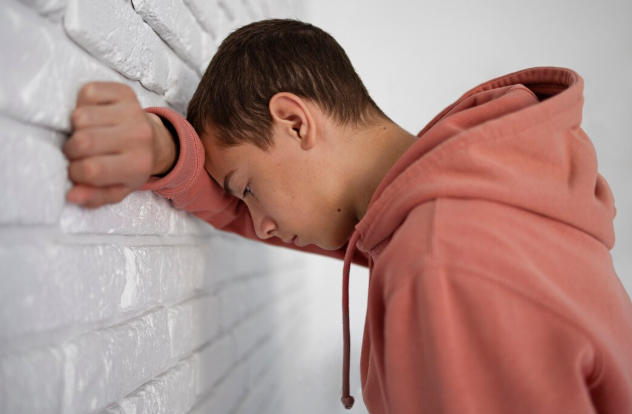Personalized strategies and treatment can help you thrive — let’s explore your options.
Offering guidance and support every step of the way.
Book Now
As a parent, it’s a fear you don’t often say out loud, but it’s there, the quiet concern you feel when you notice your teen is acting differently. They seem withdrawn, tired, or irritable, and you wonder, “Is this just normal teenage behavior, or is something more going on?”
If this sounds familiar, you're not alone. Teen depression is often misunderstood or mistaken for typical growing pains. But depression in teens is much more than a bad mood or temporary frustration. It’s real, it’s painful, and it can manifest in ways that are easy to miss if you don’t know the signs.
At Transcending Psychiatry, we work with families every day who are struggling with this exact dilemma. Teen depression often doesn’t look the way we expect. It isn’t always about sadness. Sometimes, it shows up as irritability, withdrawal, or a complete loss of interest in the things that once mattered. That’s why recognizing the signs of depression in teenagers early is so crucial.
You know your teen better than anyone else. And if something feels off, it’s important to trust your instincts. But knowing exactly what to look for in the symptoms of depression in teens can be a game-changer when it comes to getting your teen the help they need. Let’s break down the most common signs of depression and what they mean.
Teenagers need their space, but when withdrawal becomes constant, and your teen stops spending time with friends or avoiding family activities, it’s more than just “needing alone time.”
Anna, 15, used to love hanging out with her friends. They’d spend hours chatting on the phone or at the park, but suddenly, she stopped. When her mom asked if everything was okay, Anna would say, “I’m fine,” but her isolation grew, and her energy drained. This wasn’t just a phase; it was a major depressive disorder in teens. Anna wasn’t withdrawing because she wanted to; she was withdrawing because depression had made her feel like she didn’t matter.
If your teen is withdrawing from activities or relationships they once enjoyed, it’s a sign of depression that shouldn’t be ignored.
“I’m fine”. “Stop asking me!” These are just a couple of responses you might get when you try to talk to your teen about how they’re feeling. Severe depression symptoms in teenagers often include mood swings that feel much more extreme than typical teenage behavior.
Zane, 16, used to be easygoing, but recently, his parents noticed that he was snapping at them over nothing. He’d get frustrated at the smallest things and retreat to his room. One day, he broke down and admitted that he felt like he was “always angry, even though I don’t know why.” This anger was a mask for the deep sadness and frustration Zane felt from his depression.
Mood swings and irritability are often overlooked, but they are red flags that your teen may be dealing with depression.

It’s heartbreaking to see your teen lose interest in the things that once brought them joy, their hobbies, friends, and even school. When depression in teens sets in, these passions fade because depression steals motivation and joy.
Jasmine, 14, was passionate about her dance classes. She loved performing, practicing, and even talking about her dance performances at school. But one day, she stopped going to class. She’d say, “I don’t feel like it anymore.” When her parents pushed her, she admitted that she just didn’t care about anything anymore. Jasmine was struggling with depression as a teenage girl, and her loss of interest in dance was a sign of her deeper emotional pain.
If your teen stops caring about things that once mattered to them, whether it’s sports, friends, or hobbies, this is a major symptom of depression in teenagers.
You might think it’s just a “stomach bug” or “growing pains,” but physical symptoms like headaches, stomachaches, and fatigue are often linked to depression in adolescents. These symptoms are physical expressions of emotional distress, and they shouldn’t be ignored.
Luke, 16, was constantly complaining of stomachaches. He’d miss school and stay home, but no one could figure out what was physically wrong. After weeks of doctor visits, it became clear: Luke wasn’t physically sick he was emotionally struggling with severe depression symptoms in teenagers. His body was signaling the pain his mind couldn’t express.
So, how do you know when it’s time to seek help? You might ask yourself, “What percent of teens are depressed?” The truth is, that about 20% of teenagers will experience depression at some point in their adolescence. And those depression signs in teens should never be dismissed.
Here’s how to tell if your teen needs help:
If their behavior has changed significantly, especially if they’re withdrawing or showing signs of irritability, sadness, or emotional numbness.
If physical symptoms like headaches, stomachaches, or fatigue are persisting with no clear medical reason.
If they’re no longer engaging in things they once loved, or if they express feelings of hopelessness, worthlessness, or guilt.
If you’re wondering, “What are the signs of depression in a teenager?” it’s time to trust your gut. If you feel like something is wrong, it likely is. And it’s not too late to help them get the support they need.
Treating depression in adolescence isn’t about “just talking it out,” it’s about providing your teen with the right tools and support to understand their feelings and learn healthy coping strategies. Therapy can be incredibly effective for teens, helping them work through their emotions in a safe, supportive environment.
At Transcending Psychiatry, we specialize in personalized care for teens struggling with depression. Whether it’s through in-person counseling in New Jersey or Telehealth services in New Jersey and New York, we provide a space where your teen can feel heard, understood, and supported in their journey toward healing.

If you’ve recognized the signs of depression in your teen, don’t wait. Early intervention is key to helping your teen heal. At Transcending Psychiatry, we offer compassionate, evidence-based care for teens. Our personalized treatment approach includes talk therapy, CBT, and medication management, personalized to meet the specific needs of your teen.
Visit Transcending Psychiatry today to learn more about our services and how we can help your teen navigate this difficult time with support and understanding.
Offering guidance and support every step of the way.
Book Now